[译林版]4B Unit4知识点梳理
六年级上册英语-Unit4短语、词汇、知识点梳理-【译林版】(三起)
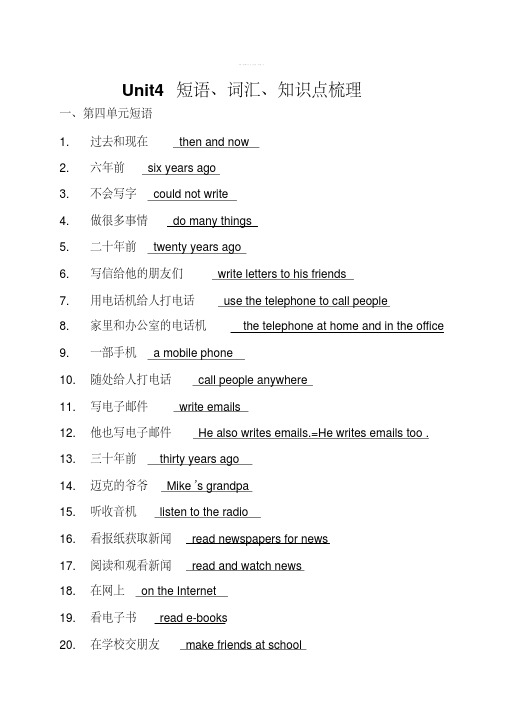
Unit4 短语、词汇、知识点梳理一、第四单元短语1.过去和现在then and now2.六年前six years ago3.不会写字could not write4.做很多事情do many things5.二十年前twenty years ago6.写信给他的朋友们write letters to his friends7.用电话机给人打电话use the telephone to call people8.家里和办公室的电话机the telephone at home and in the office9.一部手机 a mobile phone10.随处给人打电话call people anywhere11.写电子邮件write emails12.他也写电子邮件He also writes emails.=He writes emails too .13.三十年前thirty years ago14.迈克的爷爷Mike’s grandpa15.听收音机listen to the radio16.看报纸获取新闻read newspapers for news17.阅读和观看新闻read and watch news18.在网上on the Internet19.看电子书read e-books20.在学校交朋友make friends at school21.从商店里买东西buy things from shops22.全世界all over the world23.来自世界各地的网友e-friends from all over the world24.在网上购物/网购do shopping on the Internet25.贴两张照片stick two photos26.努力工作work hard27.每天every day28.我的表弟my cousin29.在度假on holiday30.美国人(复数)the Americans (口诀:中日不变,英法变,其余+s)31.发明飞机/火车invent the aeroplane/train32.英国人the British/the Englishmen33.一节英语课an English lesson34.朝窗外看look out of the window35.听我说listen to me36.继续go on37.今天是星期几?What day is today?=What day is it today?38.你会拼写它吗?Can you spell it ?39.变得生气get angry40.用“鸡蛋”造一个句子make a sentence with ‘egg’41.吃一块蛋糕eat a cake42.“鸡蛋”在哪儿?Where’s the ‘egg’?43.等待答案wait for the answer44.复习一般过去时review the simple past tense.45.一岁one year old46.三岁three years old47.贴一张你自己的照片stick a photo of yourself48.比较过去时和现在时/抚今追昔compare the past with the present二、第四单元词汇1.过去和现在then and now2.……以前ago3.使用use4.电话telephone5.办公室office6.移动电话,手机mobile phone7.随处,到处anywhere8.收音机radio9.报纸(可数名词) newspaper10.新闻(不可数名词) news11.观看watch12.电子书e-book13.交朋友make friends14.全世界all over the world15.购物do shopping16.电视TV17.朝……外看look out of18.继续go on19.仍然still20.今天是星期几What day is today?21.拼写spell22.造句make a sentence23.用with24.昨天yesterday三、第四单元知识点梳理1、一般过去时情态动词的句型转换:(1)could引导的一般过去时的否定句,在could之后加not:could not=couldn’tSix years ago, I could write.(否定句)Six years ago, I couldn’t write.(2)could引导的一般过去时的一般问句,将could调至句首:Mike could read and draw.(一般问句)Could Mike read or draw?(3)could引导的特殊问句:特殊疑问句+could引导的一般问句:They could ride a bike.(对画线部分提问)Could they ride a bike(用do what替换) ?What could they do ?2、一般过去时和一般现在时的动词形式对比:时间决定时态根据句中时间副词的不同,使用不同的动词形式。
新译林4B Unit 4 Drawing in the park
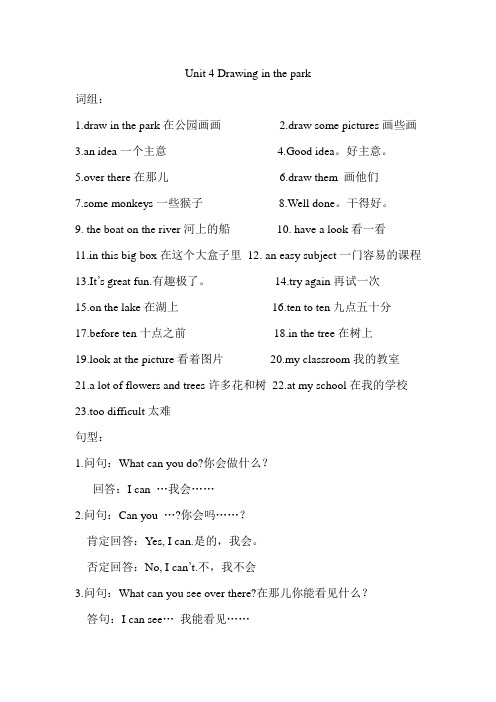
Unit 4 Drawing in the park
词组:
1.draw in the park在公园画画
2.draw some pictures画些画
3.an idea一个主意
4.Good idea。
好主意。
5.over there在那儿
6.draw them 画他们
7.some monkeys一些猴子8.Well done。
干得好。
9. the boat on the river河上的船10. have a look看一看
11.in this big box在这个大盒子里12. an easy subject一门容易的课程13.It’s great fun.有趣极了。
14.try again再试一次
15.on the lake在湖上16.ten to ten九点五十分
17.before ten十点之前18.in the tree在树上
19.look at the picture看着图片20.my classroom我的教室21.a lot of flowers and trees许多花和树22.at my school在我的学校23.too difficult太难
句型:
1.问句:What can you do?你会做什么?
回答:I can …我会……
2.问句:Can you …?你会吗……?
肯定回答:Yes, I can.是的,我会。
否定回答:No, I can’t.不,我不会
3.问句:What can you see over there?在那儿你能看见什么?
答句:I can see…我能看见……。
【译林版】4B英语 Unit4 Drawing in the park知识点汇总
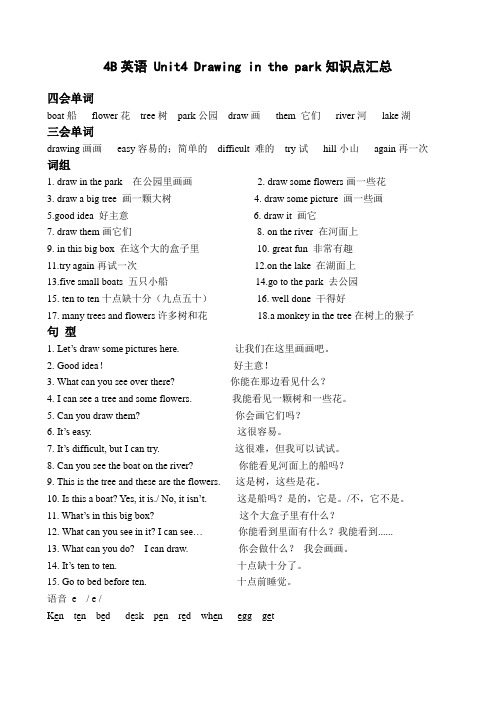
4B英语 Unit4 Drawing in the park知识点汇总四会单词boat船flower花tree树park公园 draw画 them 它们river河 lake湖三会单词drawing画画easy容易的;简单的 difficult 难的try试 hill小山again再一次词组1. draw in the park 在公园里画画2. draw some flowers画一些花3. draw a big tree 画一颗大树4. draw some picture 画一些画5.good idea 好主意6. draw it 画它7. draw them画它们8. on the river 在河面上9. in this big box 在这个大的盒子里10. great fun 非常有趣11.try again再试一次12.on the lake 在湖面上13.five small boats 五只小船14.go to the park 去公园15. ten to ten十点缺十分(九点五十)16. well done 干得好17. many trees and flowers许多树和花18.a monkey in the tree在树上的猴子句型1. Let’s draw some pictures here.让我们在这里画画吧。
2. Good idea!好主意!3. What can you see over there? 你能在那边看见什么?4. I can see a tree and some flowers. 我能看见一颗树和一些花。
5. Can you draw them? 你会画它们吗?6. It’s easy.这很容易。
7. It’s difficult, but I can try.这很难,但我可以试试。
8. Can you see the boat on the river? 你能看见河面上的船吗?9. This is the tree and these are the flowers. 这是树,这些是花。
精品译林版四年级英语下册Unit 4Drawing in the park重点语法、 基础知识整理

四年级英语(下册)重点语法、基础知识4B Unit 4 Drawing in the parkWords:1. drawing (名词) 画画Eg:My sister ______ (喜欢) _______ (画画).Eg:—你喜欢画画吗?—是的,我喜欢。
—______ you like _______ ? —Yes , I _______ .2. park (名词) 公园→复数:parks短语:在公园里in the park3. draw (动词) 画画→名词:drawing短语:画画draw picturesEg : —你会画画吗?—不,我不会。
—______ you ______ _______ ? —No , I ______ .4. good idea (名词短语) 好主意解析:good idea 用于对某事表示赞同或认可的激动心情,其近义词为great 。
Eg : ( )当有同学邀请你打篮球时,你会说:A . Yes , I can .B . Good idea !C . Let’s play basketball .5. flower (名词) 花;花朵→复数:flowers短语:种花grow flowers 赏花watch flowersEg : flowers , draw , you , can , ? (连词成句) ___________________________6. them (代词) 他们;她们;它们→主格:they →形容词性物主代词:their 他们的;她们的;它们的解析:them为人称代词的宾格形式,放在动词之后作宾语。
they是人称代词的主格形式,放在动词之前作主语。
Eg :①Can you draw ______ (they) for me ? ②______ (them) can draw pictures .7. easy (形容词) 容易的;简单的→反义词:difficult 难的;困难的注:be easy 容易的/ be difficult 难的Eg:它很容易。
译林版小学英语4B四年级下册4单元知识归纳
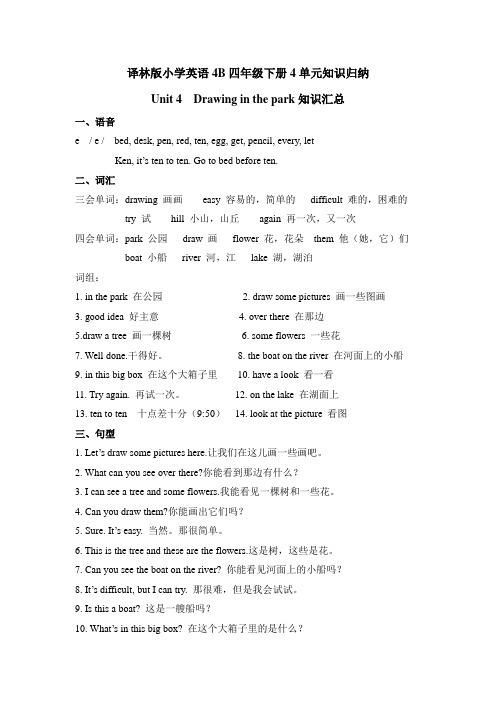
译林版小学英语4B四年级下册4单元知识归纳Unit 4 Drawing in the park知识汇总一、语音e / e / bed, desk, pen, red, ten, egg, get, pencil, every, letKen, it’s ten to ten. Go to bed before ten.二、词汇三会单词:drawing 画画easy 容易的,简单的difficult 难的,困难的try 试hill 小山,山丘again 再一次,又一次四会单词:park 公园draw 画flower 花,花朵them 他(她,它)们boat 小船river 河,江lake 湖,湖泊词组:1. in the park 在公园2. draw some pictures 画一些图画3. good idea 好主意4. over there 在那边5.draw a tree 画一棵树6. some flowers 一些花7. Well done.干得好。
8. the boat on the river 在河面上的小船9. in this big box 在这个大箱子里10. have a look 看一看11. Try again. 再试一次。
12. on the lake 在湖面上13. ten to ten 十点差十分(9:50)14. look at the picture 看图三、句型1. Let’s draw some pictures here.让我们在这儿画一些画吧。
2. What can you see over there?你能看到那边有什么?3. I can see a tree and some flowers.我能看见一棵树和一些花。
4. Can you draw them?你能画出它们吗?5. Sure. It’s easy. 当然。
那很简单。
6. This is the tree and these are the flowers.这是树,这些是花。
译林版英语四年级下册 Unit4 知识点梳理
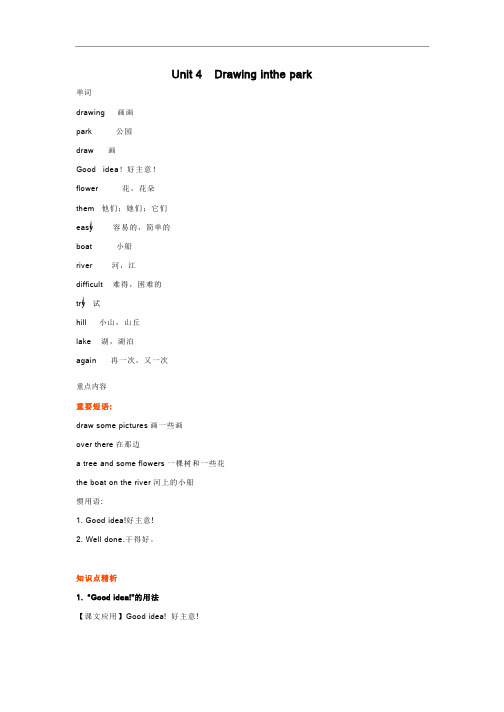
Unit 4 Drawing inthe park 单词drawing 画画park 公园draw 画Good idea!好主意!flower 花,花朵them 他们;她们;它们easy 容易的,简单的boat 小船river 河,江difficult 难得,困难的try 试hill 小山,山丘lake 湖,湖泊again 再一次,又一次重点内容重要短语:draw some pictures 画一些画over there 在那边a tree and some flowers 一棵树和一些花the boat on the river 河上的小船惯用语:1. Good idea!好主意!2. Well done.干得好。
知识点精析1. “Good idea!"的用法【课文应用】Good idea! 好主意!“Good idea!”是当别人提出一个好的建议或想法时,我们常说的一句话,有时用“That's a goodidea!”。
例如:-Let's go to the park tomorrow.让我们明天去公园吧。
Good idea!好主意2. 如何询问对方能看到什么【课文应用】What can you see over there? 在那边你能看到什么?I can see a tree and some flowers. 我能看到一棵树和一些花。
【句型结构】问句: What can you see(+其他)?答语: I/ We can see-+某物【重点解析】问句用于询问对方能看到什么。
can 意为“能”是情态动词,无人称和数的变化,与动词原形搭配使用。
问句中的“其他”可以为表示地点或时间的介词短语,如in the zoo(在动物园里),on the farm(在农场),in the morning(在早上)等。
例:- What can you see in the zoo?在动物园里你能看到什么?- I can see pandas and monkeys. 我能看到熊猫和猴子。
译林版小学英语小学四年级下册(4B)全册考点知识点归纳
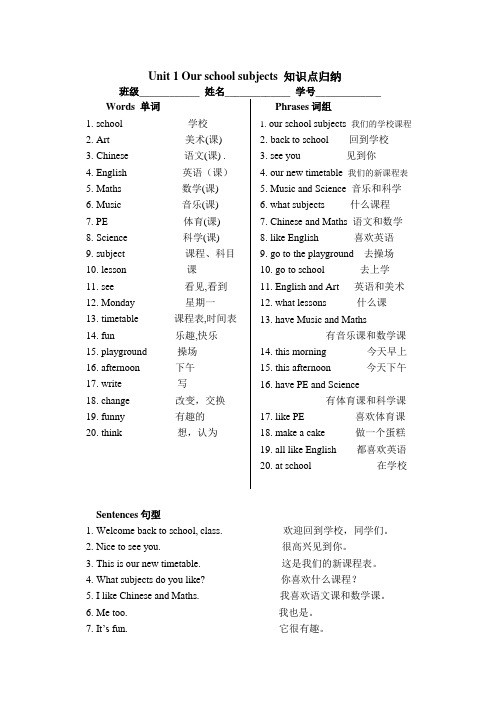
Unit 1 Our school subjects 知识点归纳班级____________ 姓名_____________ 学号_____________Words 单词1. school 学校2. Art 美术(课)3. Chinese 语文(课) .4. English 英语(课)5. Maths 数学(课)6. Music 音乐(课)7. PE 体育(课)8. Science 科学(课)9. subject 课程、科目10. lesson 课11. see 看见,看到12. Monday 星期一13. timetable 课程表,时间表14. fun 乐趣,快乐15. playground 操场16. afternoon 下午17. write 写18. change 改变,交换19. funny 有趣的20. think 想,认为Phrases词组1.our school subjects 我们的学校课程2.back to school 回到学校3. see you 见到你4. our new timetable 我们的新课程表5. Music and Science 音乐和科学6. what subjects 什么课程7. Chinese and Maths 语文和数学8. like English 喜欢英语9. go to the playground 去操场10. go to school 去上学11. English and Art 英语和美术12. what lessons 什么课13. have Music and Maths有音乐课和数学课14. this morning 今天早上15. this afternoon 今天下午16. have PE and Science有体育课和科学课17. like PE 喜欢体育课18. make a cake 做一个蛋糕19. all like English 都喜欢英语20. at school 在学校Sentences句型1. Welcome back to school, class. 欢迎回到学校,同学们。
译林版六年级英语上册第四单元知识点归类整理(第一学期期末复习资料unit 4重点归纳)

Unit 4 Then and now一、重点词组:1. 六年前 six years ago2.读书画画 read and draw3. 做许多事情do many things4. 二十年前twenty years ago5.写信给他的朋友write letters to his friends6.用电话打给人们use the telephones to call people7.在办公室里in the office8.有一个手机have a mobile phone9.随处打电话给人们call people anywhere10. 写电子邮件write e-mails11.三十年前thirty years ago12. 看电子书read e-books13. 迈克的爷爷Mike’s grandpa14. 听收音机获取新闻listen to the radio for news15. 在家at home16. 在因特网上on the Internet17. 阅读并浏览新闻read and watch news18. 交朋友make friends19. 从商店中买东西buy things from shops20. 购物do shopping21. 来自全世界from all over the world22.贴两张照片stick two photos23.指着说一说 point and say24.努力工作work hard25.每天every day26. 我的表姐妹/表兄弟/堂姐妹/堂兄弟my cousin27.在度假 be on holiday28.发明指南针/火车invent the compass/train29. 继续go on30. 朝窗外看look out of the window31. 拼写星期三 spell “Wednesday”32.变得很生气get angry33.用“egg”造句 make a sentence with “egg”34.等待答案wait for the answer35.在蛋糕里 in the cake36.看报纸获取新闻read newspapers for news37. 三岁大 three years old38.上一节英语课 have an English lesson二、重点句型:1. 过去与现在的对比,注意时态。
Unit4知识点梳理2023-2024学年牛津译林版英语七年级上册
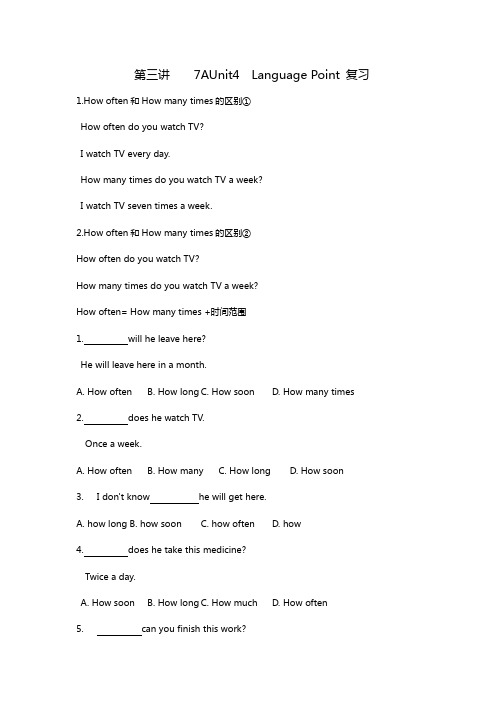
第三讲7AUnit4 Language Point 复习1.How often和How many times的区别①How often do you watch TV?I watch TV every day.How many times do you watch TV a week?I watch TV seven times a week.2.How often和How many times的区别②How often do you watch TV?How many times do you watch TV a week?How often= How many times +时间范围1. will he leave here?He will leave here in a month.A. How oftenB. How longC. How soonD. How many times2. does he watch TV.Once a week.A. How oftenB. How manyC. How longD. How soon3. I don't know he will get here.A. how longB. how soonC. how oftenD. how4. does he take this medicine?Twice a day.A. How soonB. How longC. How muchD. How often5. can you finish this work?A. How oftenB. How manyC. How longD. How soon6. have you been at this factory?I have been here since 1993A. how longB. how soonC. how oftenD. how many7. does your sister write to your parents?A. How soonB. How longC. How muchD. How often8. does it take you to finish you homework every day?.A. How oftenB. How manyC. How longD. How soon9. will he stay here?A. how longB. how soonC. how oftenD. how many10. did the meeting last?About half an hour.A. How soonB. How longC. How farD. How often3.Reading is fun.阅读是有趣的事。
译林小学英语4B各单元重点词组和句子
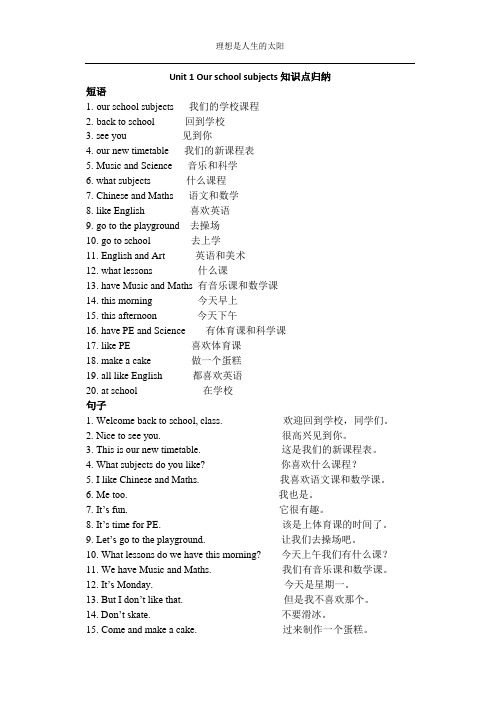
Unit 1 Our school subjects知识点归纳短语1.our school subjects 我们的学校课程2.back to school 回到学校3. see you 见到你4. our new timetable 我们的新课程表5. Music and Science 音乐和科学6. what subjects 什么课程7. Chinese and Maths 语文和数学8. like English 喜欢英语9. go to the playground 去操场10. go to school 去上学11. English and Art 英语和美术12. what lessons 什么课13. have Music and Maths 有音乐课和数学课14. this morning 今天早上15. this afternoon 今天下午16. have PE and Science 有体育课和科学课17. like PE 喜欢体育课18. make a cake 做一个蛋糕19. all like English 都喜欢英语20. at school 在学校句子1. Welcome back to school, class. 欢迎回到学校,同学们。
2. Nice to see you. 很高兴见到你。
3. This is our new timetable. 这是我们的新课程表。
4. What subjects do you like? 你喜欢什么课程?5. I like Chinese and Maths. 我喜欢语文课和数学课。
6. Me too. 我也是。
7. It’s fun. 它很有趣。
8. It’s time for PE. 该是上体育课的时间了。
9. Let’s go to the playground. 让我们去操场吧。
10. What lessons do we have this morning? 今天上午我们有什么课?11. We have Music and Maths. 我们有音乐课和数学课。
Unit4知识点梳理牛津译林版七年级英语上册

牛津译林版七上Unit 4 知识点梳理1.Wake up, Eddie. 醒醒,埃迪。
wake up:“醒来”。
“唤醒某人”:如果所接宾语是人称代词,只能放在wake和up中间;如果所接宾语是名词,放在up、前后均可。
awake:adj.“醒着的”。
2.Is it time fro breakfast? 到吃早饭的时间了吗?It’s time for sth.“是做某事的时间了。
”= It’s time to do sth.It’s time for sb. to do sth.“该是某人做某事的时候了。
”3.Shall we go walking in the hills? 我们去山上散步好吗?Shall we...? “我们……好吗?”(表示征求或提出建议。
)4.I seldom go out. 我很少外出。
seldom:adv.“很少,不常,难得”(位于行为动词之前,助动词、情态动词或连系动词之后),表示否定。
go out:“出去”。
5....and then I have lunch. ……然后吃午饭。
have lunch:“吃午饭”。
→have breakfast “吃早饭”;have dinner/supper “吃晚饭”。
have:v.“吃;喝”;“有”;“举办,举行”;“度过,经历”。
三单:has。
6.After lunch, I always need a good rest. 午饭后,我总是需要好好休息。
need:v.“需要”。
need sth. “需要某物”;need to do sth. “需要做某事”;need sb. to do sth. “需要某人做某事”;sth. need(s) doing “需要”。
情态动词,“需要”,后接动词原形,常用于否定句和疑问句。
rest:n.“休息,歇息”(= break)。
have a (good) rest “(好好)休息”。
作动词,“休息”。
[译林版]4B Unit1-4 知识点整理
![[译林版]4B Unit1-4 知识点整理](https://img.taocdn.com/s3/m/2193edbbe43a580216fc700abb68a98271feac98.png)
4B Unit1 Our school subjects知识点1.学科类名词首字母大写,如Chinese;Maths.2.what subjects和what lessons区别:①what后面的学科和课要加s,即what subjects和what lessons;②what subjects是科目、学科,subjects一般和like连用;如:What subjects do you like?你喜欢什么学科?答:I like...③what lessons是课,lessons一般和have连用;如:What lessons do you have?你有什么课?答:I have...特殊情况:如果强调的是本学期有什么科目,subject与have连用3.评价某个学科有趣:It's fun.4.今天早上this morning 在早上in the morning5. 多个学科并列前面用逗号,隔开,最后两个用and连接。
6. Nice to meet you. (初次见面)Nice to see you. (熟人见面)7.It’s time for+名词.=It’s time to +动词.如:It’s time for PE.=It’s time to have a PE lesson.It’s time for school.=It’s time to go to school.8.What about you?=How about you?你呢?9.Welcome back to+地点,欢迎回到某地10.操场前面加the: go to the playground去操场4BUnit2 After school知识点1.星期考点:①星期日到星期六(拼写):Sunday星期日;Monday星期一;Tuesday星期二;Wednesday星期三;Thursday星期四;Friday星期五;Saturday星期六;②一个星期的第一天是星期日;Sunday is the first(第一) day of the week.③星期前面介词用on;即on+星期几;on Tuesday morning;④对星期几提问:What day is it today? 答句:It's +星期几.2.some用于肯定句,any用于否定和疑问句如:I don’t have any lessons on Sunday.我在星期日没有课。
译林版四年级上 Unit4 知识点梳理
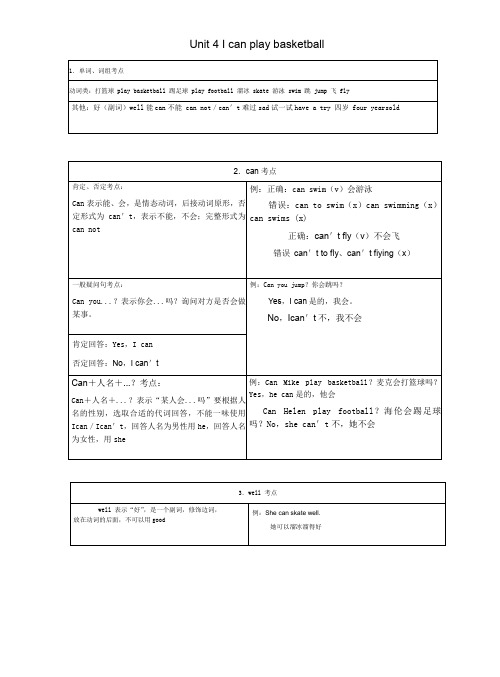
well 表示“好”,是一个副词,修饰边词,
放在动词的后面,不可以用good
例:She can skate well.
她可以溜冰溜得好
4.too,either 考点
too表示也,用于肯定句,either 表示也,用于否定句,只要是含有don't,can't的否定句中too 都要改为either.
错误 can't to fly、can't n you...?表示你会...吗?询问对方是否会做某事。
例:Can you jump?你会跳吗?
Yes,I can是的,我会。
No,Ican't不,我不会
肯定回答:Yes,I can
否定回答:No,I can't
Can+人名+...?考点:
错误:I can play skate.(x)
I can skate. (✓)
解析:此处不能加play,因为play和 skate均为动词
错误:I can play the basketball.(x)解析:play+球类,中间不能加冠词the
7.play 考点
打篮球 play basketball 踢足球 play football打乒乓球 play table tennis play 后接球类名词时,不能加 the,a,my等词;
溜冰 skate:游泳 swim 飞 fly均为动词;它们都是单独的动词,前面不能加play;
例:
正确:I can play basketball(✓);
2.can考点
肯定、否定考点:
Can表示能、会,是情态动词,后接动词原形,否定形式为can't,表示不能,不会;完整形式为can not
例:正确:can swim(v)会游泳
苏教译林版小学英语四年级上册 Unit4 知识点梳理

3. well 考点
well 表示“好”,是一个副词,修饰边词, 例:She can skate well.
放在动词的后面,不可以用 good
她可以溜冰溜得好
4.too,either 考点
too 表示也,用于肯定句,either 表示 例:I can't fly either.我也不会飞.
2.can 考点
肯定、否定考点:
例:正确:can swim(√)会游泳
Can 表示能、会,是情态动词,后接动词
错误:can to swim(×)can swimming(×)
原形,否定形式为 can’t,表示不能,不会; can swims(×)
完整形式为 can not
正确:can’t fly(√)不会飞
Unit 4 I can play basketball
1.单词、词组考点 动词类:打篮球 play basketball 踢足球 play football 溜冰 skate 游泳 swim 跳 jump 飞 fly 其他:好(副词)well 能 can 不能 can not/can’t 难过 sad 试一试 have a try 四岁 four years old
Can+人名+…?考点:
Can+人名+…?表示“某人会…吗”要根据人 名的性别,选取合适的代词回答,不能一 味使用 I can/ I can’t,回答人名为男性用 he,回答人名为女性,用 she
例:Can Mike play basketball?麦克会打篮球 吗?Yes, he can 是的,他会
苏教版最新译林版小学四年级英语下册4B知识点

苏教版最新译林版小学四年级英语下册4B知识点译林版小学四年级英语下册知识点复习总结Unit1Ourchoolubject一.单词chool学校ubject科目,学科ee看到,看见Chinee语文Math数学Art美术Muic音乐Monday星期一leon课二.词组newubject新课程whatday星期几whatleon什么课ourchoolubject我们的课程三.句型1.Whatubjectdoyoulike你喜欢什么课程?IlikeChineeandMath.我喜欢语文和数学。
2.Let’gotothelibrary.让我们一起去图书馆。
(Let’=Letu)3.Whatleondowehavethimorning我们今天上午有什么课?WehaveMuicandPE.我们有音乐和体育。
What_______doyouhavethiafternoonIhaveeight________thimorning.What_______doyouhavethiterm(学期)Ihaveeight________atchool.四.发音Aa/ei/cake蛋糕grape葡萄make做kate滑冰table桌子name名字plate盘子take拿,带wake醒来baby婴儿五.练习(一)、单项选择。
1.Howmany_______doyouhavethiterm(学期)?Wehavefive.A.ubjectB.aubjectC.ubjectD.anubject5.A:HowmuchitheArtbookB:_____________AIt’five.BThey’refouryuan.C.It’fouryuan.D.Theyarefour6.—What________doyoulike—IlikeEnglih.Itifun.A.ubjectB.ubjectC.aubjectD.anubject(二).连词成句。
新译林 4B U4 知识点 整理
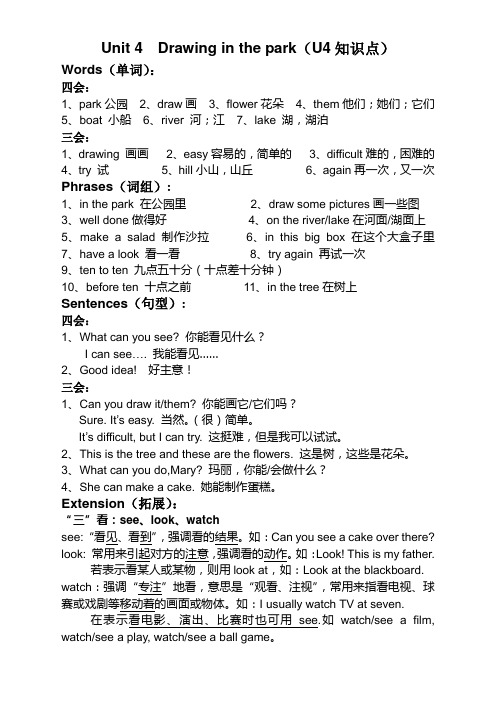
Unit 4 Drawing in the park(U4知识点)Words(单词):四会:1、park公园2、draw画3、flower花朵4、them他们;她们;它们5、boat 小船6、river 河;江7、lake 湖,湖泊三会:1、drawing 画画2、easy容易的,简单的3、difficult难的,困难的4、try 试5、hill小山,山丘6、again再一次,又一次Phrases(词组):1、in the park 在公园里2、draw some pictures画一些图3、well done做得好4、on the river/lake在河面/湖面上5、make a salad制作沙拉6、in this big box 在这个大盒子里7、have a look 看一看8、try again 再试一次9、ten to ten 九点五十分(十点差十分钟)10、before ten 十点之前11、in the tree在树上Sentences(句型):四会:1、What can you see? 你能看见什么?I can see…. 我能看见……2、Good idea! 好主意!三会:1、Can you draw it/them? 你能画它/它们吗?Sure. It’s easy. 当然。
(很)简单。
It’s difficult, but I can try. 这挺难,但是我可以试试。
2、This is the tree and these are the flowers. 这是树,这些是花朵。
3、What can you do,Mary? 玛丽,你能/会做什么?4、She can make a cake. 她能制作蛋糕。
Extension(拓展):“三”看:see、look、watchsee:“看见、看到”,强调看的结果。
如:Can you see a cake over there? look: 常用来引起对方的注意,强调看的动作。
- 1、下载文档前请自行甄别文档内容的完整性,平台不提供额外的编辑、内容补充、找答案等附加服务。
- 2、"仅部分预览"的文档,不可在线预览部分如存在完整性等问题,可反馈申请退款(可完整预览的文档不适用该条件!)。
- 3、如文档侵犯您的权益,请联系客服反馈,我们会尽快为您处理(人工客服工作时间:9:00-18:30)。
4B Unit 4 Drawing in the park
一、语音:
字母e和ee的读音[ i: ] me she green sleep three
二、单词:
1. park 公园
2. draw 画
3. flower 花,花朵
4. them 他(她,它)们
5. boat 小船
6. river 河,江
7. lake 湖,湖泊8. drawing 画画9. easy 容易的
10.difficult 难的11. try 试一试12.hill小山
13. again 再,又
三、词组:
1. in the park 在公园
2. on the lake 在湖面上
3. in this big box 在这个大箱子里
4. the boat on the river 在河上的小船
5. ten to ten 九点五十、十点差十分
6. draw a tree 画一棵树
7. have a look 看一看8. over there 在那边
9. some flowers 一些花10. look at the picture 看图
四、句型:
1. Let’s draw some pictures here. 让我们在这儿画一些画吧。
2. What can you see over there? 你能看到那边有什么?
3. I can see a tree and some flowers. 我能看见一棵树和一些花。
4. Can you draw them? 你能画出它们吗?
5. Sure. It’s easy. 当然。
那很简单。
6. This is the tree and these are the flowers. 这个是树这些是花。
7. Can you see the boat on the river? 你能看见河面上的小船吗?
8. It’s difficult, but I can try. 那很难,但是我会试试。
9. Is this a boat? 这是一艘船吗?
10. What’s in this big box? 在这个大箱子里的是什么?
11. It’s great fun. 它非常有趣。
12. What can you see in it? 在里面你能看到什么?
13. I can see a boat on the lake.我看见湖面上有一艘小船。
14. Ken, it’s ten to ten. Go to bed before ten.肯,九点五十了。
十点之前去睡觉。
15. Good idea!好主意!
16. Well done.干得好。
五、语法:
1.can 为情态动词,后面跟动词原形。
如:I can play football. He / She can dance . We /They / You can --- .
2.It’s ten to ten. = It’s nine fifty. 表示差十分钟就十点,即九点五十。
六、拓展:
1.词汇:mountain, hard
2.句型:Let’s grow flowers. Let’s plant trees. Let’s row the boat.
3.语法:can + 动词原形;let’s +动词原形
4.阅读:。
